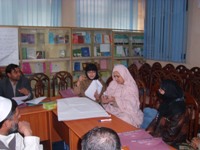Afghanistan - Iraq - Jordan - Pakistan - Sudan
Focus country: Afghanistan
 WHO gender mainstreaming training for health managers in Jalalabad, AfghanistanIn 2006, WHO initiated a gender and health programme in Afghanistan. The Ministry of Public Health introduced a gender unit within the Reproductive Health Directorate shortly thereafter. In 2008, the Ministry upgraded the gender unit to a Gender Directorate. This was done to facilitate the mainstreaming of gender and health equity across all health programmes, rather than having a sole focus on reproductive health.
WHO gender mainstreaming training for health managers in Jalalabad, AfghanistanIn 2006, WHO initiated a gender and health programme in Afghanistan. The Ministry of Public Health introduced a gender unit within the Reproductive Health Directorate shortly thereafter. In 2008, the Ministry upgraded the gender unit to a Gender Directorate. This was done to facilitate the mainstreaming of gender and health equity across all health programmes, rather than having a sole focus on reproductive health.
WHO support
The WHO country office provides support to the Ministry of Public Health Gender Directorate in the following areas:
training on gender mainstreaming in healthreview of Ministry polices and programmes for gender sensitivityprovision of technical support for mainstreaming gender across Ministry health programmestechnical assistance in strengthening the health sector response to gender-based violence.
Operational research and gender analysis
A gender assessment of access to, and utilization of, primary health care was conducted in Nangarhar, Kapesa and Bamyan in 2010. The gender analysis findings were used to inform the priorities for a five-year gender and health action plan (2012–2017).
Iraq
Violence against women is the focus of the WHO Iraq gender in health and development programme. A multisectoral project is in progress, which includes identification of gaps and opportunities for addressing violence against women/gender-based violence through different sectors in Iraq.
Jordan
Research is the focus of the gender in health and development programme of WHO Jordan. Most recently, a study was completed on the roles of women within healthy village programme communities in Jordan that examined their levels of empowerment.
Empowerment was measured through: education level; employment; control over earnings; amount of involvement in associations, clubs or groups; amount of political involvement in elections; levels of decision-making; and attitudes towards domestic violence.
Pakistan
The gender in health and development programme of WHO Pakistan focuses on three key areas: capacity building, advocacy and research. The programme also provides support to the national health sector response to gender-based violence.
Government ministries, health managers and health service providers make up the bulk of participants in capacity-building workshops. Advocacy is conducted in coordination with civil society and UN agencies to promote health sector action against gender inequalities, including gender-based violence. The focus of research is on identifying and addressing gender-related barriers in health policies, programmes and plans.
Sudan
Achieving gender and health equity in national health policies, programmes and plans is the objective of the WHO Sudan gender in health and development programme.



